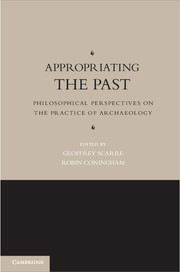Book contents
- Frontmatter
- Contents
- Contributors
- Editors
- Chapter 1 Introduction
- Part One Claiming the Past
- Part Two Problems of Meaning and Method
- Part Three Problems of Ownership and Control
- Chapter 13 Legal Principles, Political Processes, and Cultural Property
- Chapter 14 Monuments versus Moveables
- Chapter 15 Looting or Rededication?
- Chapter 16 Partitioning the Past
- References
- Index
- References
Chapter 13 - Legal Principles, Political Processes, and Cultural Property
Published online by Cambridge University Press: 05 December 2012
- Frontmatter
- Contents
- Contributors
- Editors
- Chapter 1 Introduction
- Part One Claiming the Past
- Part Two Problems of Meaning and Method
- Part Three Problems of Ownership and Control
- Chapter 13 Legal Principles, Political Processes, and Cultural Property
- Chapter 14 Monuments versus Moveables
- Chapter 15 Looting or Rededication?
- Chapter 16 Partitioning the Past
- References
- Index
- References
Summary
This chapter asks whether legal principles provide a satisfying framework for resolving disputes over control or access to an object or site of archaeological interest. It is concerned with situations in which individuals or groups feel that specific sites or objects have a special value in maintaining their identity and that archaeological work may affect that value. For example, they may feel that archaeological study would subject objects or sites to physical disturbances that are prohibited on religious or cultural grounds. Or they may fear that archaeological methods may produce results that undermine religious or cultural beliefs, or that they cannot get access to sites or objects as needed for important religious or cultural practices. In these situations, the lack of control over archaeological activity may threaten identity in some way. In such cases, one would hope that the parties could reach agreement. Indeed, the Society for American Archaeology has stated, in its Principles of Archaeological Ethics, that “responsible archaeological research, including all levels of professional activity, requires an acknowledgment of public accountability and a commitment to make every reasonable effort, in good faith, to consult actively with affected group(s), with the goal of establishing a working relationship that can be beneficial to all parties involved.” One would hope that there is a basis for cooperation. However, if agreement cannot be reached, the individuals or groups may turn to the law for support.
Numerous laws already reflect concerns over identity and cultural property. For example, in the United States, the Native American Graves Protection and Repatriation Act imposes duties on federal agencies regarding the return of human remains and cultural objects. The UN Declaration on the Rights of Indigenous Peoples puts the ratifying states under an obligation to protect the cultural property of indigenous peoples. Many states also have legislation for the protection of cultural heritage, with restrictions on the destruction of historic buildings and the export of culturally significant art and artefacts. There are also many other laws that can be used to protect cultural identity, even if not enacted specifically for that purpose. Land-use planning and environmental protection laws are examples.
- Type
- Chapter
- Information
- Appropriating the PastPhilosophical Perspectives on the Practice of Archaeology, pp. 239 - 256Publisher: Cambridge University PressPrint publication year: 2012
References
- 1
- Cited by



